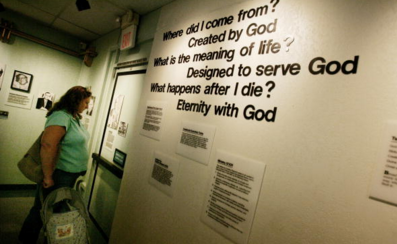Last month a Kentucky judge ordered the state to award a Creation-themed attraction (owned by Answers in Genesis (AiG) — a semi-popular Creationist organization) a subsidy amounting to upwards of $18 million. This was after the organization sued the state when they were denied the bid — a denial aimed at AiG’s discriminatory hiring practices, which violate Kentucky State laws. This subsidy — and the judge’s ruling — should not be administered by the state. Not because of the injury caused by the argument of Creation, but rather because a state’s subsidy should not be permitted to aid an organization that engages in unlawful, discriminatory practices. It’s that simple.
The to-be-subsidized Creationist attraction — a full-size re-creation of Noah’s Ark — will act as sister to AiG’s Creation Museum. AiG plans to open “phase one,” the Ark Encounter, this year in July. The organization hopes next to re-create — no doubt with money they hope to swindle from Kentucky — “a pre-Flood walled city, the Tower of Babel [and] a first-century village” as part of an exhibition of historical monuments as described in the Bible. All of this will, of course, simply add to the already popular Creation Museum, which makes visual Creationists’ 6,000 year-old Earth theory; complete with Garden of Eden, dinosaurs, humans co-mingling and questionable geologic assertions, I can only guess that there must also be a diagram of James Ussher’s original, pre-Ancestry.com calculation of the age of the earth based solely on the number of times the word “begat” appears in the Bible.
If AiG receives a subsidy — the original intent of which was to promote the growth of Kentucky businesses and community programs, not to endorse any religious sect — a very problematic precedent will have been set, allowing “qualifying” businesses, regardless of adherence to state laws protecting the rights of its citizens, the ability to demand a portion of that state’s taxpayer revenues via government subsidies. Supreme Court rulings (in Bob Jones University v. United States and Christian Legal Society v. Martinez) have already made valid individual states’ rights to deny petitioners’ requests for subsidization if those petitioners engage in discriminatory acts. AiG’s Ark Encounter and Creation Museum do exactly that: they actively practice hiring discrimination based on an applicant’s religious affiliation. The group makes little effort to hide that fact.
Far be it from me to say definitively that any company must be required to hire an individual if a difference in ideology makes a working relationship implausible — especially if that company is in essence a religious entity selling religion as a product. However, I also think it wrong for that same company to expect the state’s support, especially if it simply chooses which of the state’s laws to abide by and which to reject. If AiG wants to repeatedly refuse to follow Kentucky’s business law, it should not benefit from the state’s money. This is a similar argument to the one I would make against the Hobby Lobby decision, where I’d say a business’s religious affiliation should not infringe on the rights of its employees. Yet, in its long and muddled history of cases, the Supreme Court has already ruled that a state does not have to subsidize a qualifying business venture if that business follows antediluvian, discriminatory operating procedures — as does AiG.
Unfortunately, this is still an issue. Whereas I believe the Creationist argument is both desultory and inane, I think it equally bonkers that Judge Gregory Van Tatenhove is forcing Kentucky to pay the $18 million to a group that is not only behind the times but actively disrupts fair and civil hiring procedure.


